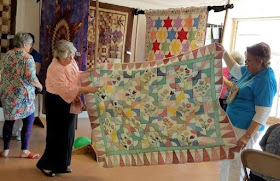1. Pre-show planning: finding and comparing venues; determining a hanging system, rental costs, who and how it will be set up; scheduling both people and events; marketing; assigning people to work; etc.
 A show of fewer than 30 quilts would be a disappointment to patrons, who may not return for the next show. Plan ahead for what to do should there not be enough quilts for your show. Set a deadline for entries so you will know in advance how many quilts you have. Then move to your Plan B if necessary.
A show of fewer than 30 quilts would be a disappointment to patrons, who may not return for the next show. Plan ahead for what to do should there not be enough quilts for your show. Set a deadline for entries so you will know in advance how many quilts you have. Then move to your Plan B if necessary.3. It takes many people: to clean, to hang quilts, to take down quilts, to sell tickets, to sell raffle tickets, to work the craft booth, to organize and get everyone working. How will you get these people? Do you have a "right-hand" who can handle those jobs you can't get to? Can you plan activities around work schedules? Are there jobs for those who can't handle the heavy lifting but are still willing to help? (Two ladies helped by hand-sewing sleeves on quilts.)
4. Porta potties, water, and other services require time: determining how many you'll need, where to put them and getting permission from the owner, payment, drop off and pick up, supplies, and so on.
5. Additional events that go along with the show: in our case the town held a city-wide garage sale, the museum held a special art show, and the guild also had a craft fair. Those events were meant to draw more people into the town than the quilt show alone could.
6. Will the show include quilt-related activities, such as trunk shows, demonstrations, Quilt of Valor etc.? Although we planned for two separate trunk shows and three demonstrations, things did not go as planned. Although six people had promised to bring quilts and to speak for five minutes, only three members participated.
What will you do if an activity doesn't go as planned? How will you fill the time? Is there a way to make adjustments so that people who paid an entry fee will feel that they got their money's worth? Can you afford to lower entry fees? Can you find someone to step in at the last moment? To make up for the lost time, I brought in quilts for sale in my booth, which meant extra work for me and presenting without having time to prepare.
There are other considerations that arise, of course. Certainly it's not possible to plan and prevent all problems, but thinking ahead and having many people who are able to step in and help when the problems do arrive can prevent some big issues. It's true that the best plan is to start early and plan ahead.
Try to think about what could go wrong and how best to deal with those possibilities. While many people say that it's a negative way to look at your event, the reality is that it's actually a positive way to run your event. Don't mix up looking at your event and running it. Those are separate ideas.
Looking at your event means having hopes and dreams for activities--what you want other people to see.
Running your event means careful planning, contingency plans, and people you can count on--what you don't want patrons to see.
Thinking of them in separate terms means you and your patrons will be better able to enjoy both. What would you add to these big ideas? What problems about your own show would you like to share or discuss? Can you explain in a different way how looking at the event and running it are separate? Please add your thoughts in the comments.












No comments:
Post a Comment
I read every comment and will visit your blog. Responses to questions and comments will be here, so come back for answers and let's have a conversation. You get the next word!